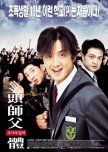
Esta resenha pode conter spoilers
Watch it for the insights into South Korean society.
This film, from 2001, is in my eyes more interesting for its historical value and the insights it gives into South Korean society then -- and now -- than for its own merit.The story itself is okay-ish, I did not laugh that much even if it was supposed to be a comedy (there was too much violence against innocents for that). In the storytelling, the directing and the camera work we can see the roots of today's masterpieces, it's still uneven but there are also brilliant scenes.
For that, and the insights into society, I'll give eight stars.
I have been thinking for a while now that violence seems to pervade South Korean's society (which is not that surprising, considering people lived under a military regime until 1987, and also the strictly hierarchical structure that's still there). In this movie, this idea was confirmed.
Yes, it's a film about gangsters, and a comedy, so a certain amount of violence is to be expected. But let's have a look at the different situations where people use force:
1. The violence amongst the gangsters is, as I said, expected. But I want to point out one aspect -- the boss casually slaps around his subordinate. If you've seen other K-Dramas, you've probably seen this kind of violence a lot. It's only interesting in the light of ...
... 2. the bullying of the newbie by the class bully and his cronies, which is probably intended as funny. The roles are inverted, the boss is now the victim and can't fight back (because he, in turn, is pressured by HIS boss to get an education). The bully, in turn is ...
... 3. bullied by another gangs of students. Violence begets violence -- but this circle of violence is not even worth mentioning for the protagonists. Instead the main character "defeats" the bullies by beating them up.
4. Teachers slap their students around habitually. This was, until a few years ago, a practice condoned by society in South Korea. I don't know if it still is. Slapping, beating students when they are already on the ground, beating them with sticks -- all of it is obvously "okay".
4. The violence against teachers (by students, by parents) is, in contrast, very much condemned.
So, violence against subordinates, against those lower in seniority, against those lower in status -- this is absolutely all right in this movie. As media are just a mirror of society, this is what people who are now adults, have learned. You can see this in the interaction between fathers and sons, between bosses and subordinates. It becomes clear when an older man in a drama has difficulties to understand that young people (especially women, but that's a whole other kettle of fish) are allowed to speak their minds.
If you, dear reader of this review, watch your next K-Drama, maybe keep this in mind while interpreting the drama, you might see certain scenes in a new light.
Esta resenha foi útil para você?
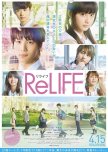
I haven't read the manga, and haven't watched the anime adaptation, so this is solely for the movie.
First, what I liked:
As usual with Japanese productions, the use of light and colours was exceptional. It's especially noticable in Kaizaki's old workplace, where drab greys dominate -- and the light is changed according to the mood of the scene.
I also liked how background music was only used very sparingly.
The ending was also well done -- we really don't need more than the "ano" at the end. We had been told that they will retain their memories. so anything more would be redundant. I also would have liked if the film had ended after Yoake had left his reports on his desk. We don't need to be told everything, we can think for ourselves sometimes.
I don't mind so much that the six characters stay relativly bland. In a film with a runtime of two hous, there will be limitations. I do think that the other subject could have had a deeper backstory -- or the writer could have committed to only focus on the main protagonist Kaizaki and his journey of change.
Even so, none of the characters' stories managed to capture my interest -- except for Yoake, whose story I'd really like to hear. (Really, I think he is the most fascinating one, and *his* story of change, what he feels and thinks when he, the one who is supposed to be the unemotional observer, begins to like his subjects? *That* would have been interesting.) For a story about character development, it is a huge minus that I feel kind of meh about the main characters.
I can imagine that other people can relate more to Kaizaki's struggles and the story of the last year at school and their message of "Treasure the Now" than I do, so this is extremely subjective.
For me, I wouldn't have missed anything if I hadn't watched the film, but it wasn't so bad that I regret it either.
Esta resenha foi útil para você?
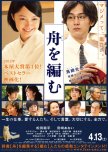
When you find your calling in life
I always admire people who have found their calling in life, and dedicate large parts of it to their passion. This film is about this kind of people -- who work steadily towards one goal, with a lot of hard work, attention for detail and perseverence.It's very Japanese in it's slow story telling, the lights and colours and the detailed sets. It's, again, a story about a small group of outsiders doing a work which is underappreciated by others, who find solace and satisfaction in what they do, not necessarily in what others think of it.
I'm not a het romance fan, but I liked the love story between the main protagonist and the landlady's granddaughter. They are full of respect for each other and the other's passion and interests, even though they don't quite understand them.
And one aspect I also liked: It's a story about words, but in moments of great emotion, the characters fail to find the right words to express them; and in the story telling, silence and the gentle background music is at least as important as the dialogue.
Well worth it.
Esta resenha foi útil para você?
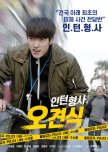
Esta resenha pode conter spoilers
This film feels more like a pilot for a series. I'd even say it feels like an exposé for a series -- the movie's plot could have been the first half of the episodes, with the later half dedicated to the resolution of the main character's backstory.The plot seems unfinished, some parts of it feel rushed, and it's unfortunate that a lot of backstory just gets told via the older detective's thoughts. I also would have liked to see more of all characters, and more of how they grow to like the main character. As it is, we still get a surprising amount of character development, especially from the team leader. (Heo Sung Tae is a highlight, as always.)
I think if the writer might have originally planned to have this produced as a longer series. There's a surprising amount of world building there, the characters all seem to have much more backstory than what we got to see. I certainly would like to watch this as a longer series, if it ever gets made.
Well, who knows what happened, at least they got a small budget for making this film, right?
One thing that is probably better because of the short duration of the movie: There was no time to force a romance subplot into it.
Overall, the movie does what it can with its short time and low budget, and it is a nice watch for a rainy afternoon or so.
Esta resenha foi útil para você?

I don't mind the rather predictable story about the men going on a drunken trip, and the ensuing entanglement with the local drug dealing ring -- but did they have to make it sexist? Especially the scene at the beach on the first day was terrible to watch. Also, the other female characters were at turns harassing the men and being the weak victim.
The stars are for the acting, the drug dealing plot, and the overall cinematography.
Esta resenha foi útil para você?

1980s action movie cop meets progressive millenial
Mao Bang Yu and Wu Ming Han couldn't be more different -- while the latter is a walking 80s action movie cop cliché, complete with casual sexism, homophobia and fast car chases, the former is an enviromentally aware, gay and family oriented millenial.What could go wrong, when those two are tied in a ghost marriage and Wu Ming Han has to help his "husband" move on to the next life?
Don't let yourself be fooled by the macismo in the beginning, this movie will show its depth later on.
This movie combines the best of old-fashioned action movies with a healthy dose of humour, criticism of sexism and homophobia, and a story about personal growth.
The bickering between the two main characters made me laugh, the grandma and her circle of aunties giggle, and the father's story cry.
Only one aspect is rather unfortunate, that with all the good messages about tolerance and equality, the fat, gay cop remained an object of "comedy", and did not get his own moment to shine.
The acting is great overall, the pacing fast, but lets the quieter moments breathe. I never would have thought that an action film could move me to tears, but this on did.
Esta resenha foi útil para você?
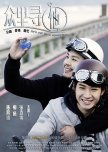
This becomes very obvious in this film. The question of what Mu Ran will find when he arrives -- thee meaning of "Su Chen", who he is and where he is -- this is not the point of the film (also very obvious after a while).
The people he will meet on his journey, who live very different lives but are all part of the queer community, who will tell their stories about love and loss, about family and partnership, these people and their stories are at the heart of the film.
Mu Ran, and with him the viewers, will learn what it can mean to love. Will we regret having taken or not taken the opportunity to find happiness?
Esta resenha foi útil para você?

Mr. Nietzsche in the Convenience Store
0 pessoas acharam esta resenha útil
Most of the scenes are relatively unconnected, there's not much plot development (and certainly no character development), and apart from the last episode, most of the scenes could have been swapped around without any detriment to the whole.
These unconnected skits remind me of the best of British comedy of the 1960s to 1980s in the heritage of Monty Python. The absurdity rivals skits like "The Cheese Shop" or "The Dead Parrot". It certainly wouldn't have been out of place in shows like "Not the Nine o'clock News" or "Fry and Laurie", only that the humour is, of course not in the English style but very Japanese.
The characters -- obviously caricatures -- are excellently done by the actors, and, if all of them did not have the great comedic timing they have, I'd suspect a lot of ad-libbing, this feels just so fresh and spontaneous.
You might find it too weird if you're not much into the surreal and absurd side of life, but if you are, you should give this series a try!
Esta resenha foi útil para você?

I appreciate what they wanted to do...
... but this was not it.The premise of the mini-drama, that a normal guy finds it completely normal to help others in need -- and to make a comedy out of it, I love it.
I loved the message that a "Super-Maen" can exist in each of us , and that society might be better if we would be more like Maen.
I liked the criticism of modern "journalists" who in its pursuit of stories not only disrupts ordinary people's lives but sometimes go so far as to fabricate stories out of thin air.
I liked how it shows how fickle society can be, when people flip from adoring to condemning in an instant.
I liked the problems that were touched upon, like domestic violence and poverty.
I loved Maen's family -- the parents with their hobbies were comedic gold!
Unfortunately, the other actors tried too hard -- quite a lot of their scenes could have been funny, but something was lacking. Sometimes it was the acting (which was either too much or not enough, especially Mew Suppasit's scenes with the young boy it seemed as if he forgot how to act), sometimes the script dragged (some comedic bits were just too drawn out -- comedy is all about timing, and it's missing here).
Honestly, I found it hard to get through both episodes.
Overall, I could have lived happily without watching it, but it's only two hours, so I'm not too bothered.
Esta resenha foi útil para você?

Kabe-Koji-Nekoyashiki-kun Deseja Ser Reconhecido
0 pessoas acharam esta resenha útil
Esta resenha pode conter spoilers
Don't let yourself be fooled by the comedy
This is one of the queerest BL dramas I've watched so far, a hilarious comedy with two people who find their way to self-acceptance. [more on that with spoilers below the ***.]The comedy is strong in this drama, so much so that I was completely thrown when things got much more serious near the end of episode 3 when I first watched it. It has the Japanese-typical style of acting for comedies, wonderful side characters, and a lot of funny moments. I love how they decided to put strong manga elements in -- like the onomatopoeic word like for the ringing clock, or certain style elements like the extended bellies after overeating. Also, though not part of the comedy side, I loved how the flashbacks are initiated by "opening" a manga-like panelled page.
All of the characters have their comedic moments -- best of them all is, the bearded beauty, who is just so kind-hearted that even Mamoru can't help but to like him.
The script and the directing is very tight -- there's not a second of irrelevance in this drama, it's either for a comedy element or for the plot development. I liked the use of light and darkness to accentuate the feelings of our protagonists. And the intro song has become one of my favourites!
Acting is great all around. Even after several rewatches, I've not found a flaw. Especially Issei's facial expressions are so spot-on,that I just looked at his face for a whole rewatch -- when does Issei use a fake smile, when a real one; when does he stop smiling, and does he look relaxed or menacing when he does that? Really, I've only seen one actor use smiles of a similar calibre, and that was in Beyond Evil.
***
And this is the spoilery part, but also where I explain why this drama goes much deeper than I thought at first:
Mamoru, who is our main character, has felt like an outcast since ... maybe forever. He is a gay man with a love of drawing gay erotic muscle doujin -- both things that define him and which he feels are to be ashamed of, to be hidden.
And which queer teenager hasn't at least once felt like that? (Well, minus the gay muscle doujin, perhaps.)
Only, for Mamoru, this feeling of being alone, of being someone with a shameful identity -- this feeling transforms his whole sense of self. Only during the ComiKing, where he can sell his work alongside same-minded people, and only when his work sells well, is this dark cloud lifted for a short time.
He is not able to understand that his family's indulgence is not indifference, that Yamada is not just someone who likes reading his doujin but also his friend, and he is not able to hear that Issei's "I like you" is not the same "like" as in "I like my fans".
It takes a journey through dark days for Mamoru to accept who he is and what he loves.
I love how this drama tackles how living in our world can impact the sense of self of queer people -- and that it shows us that maybe, if we dare to tell the world who we love, light will fill our life and we can find happiness.
Esta resenha foi útil para você?
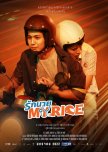
Esta resenha pode conter spoilers
Solid Thai BL with blue-collar characters
If I had to recommend some Thai BL dramas, then this one would be among the recs for someone who has seen a few already and wants to explore the genre some more.What I liked:
* Highest point: Blue-collar workers in a lot of roles and as love interest, which is a refreshing deviation from all the super-rich college boys, who I am sick of. We need more normal people in Thai BLs. In connection to that, a gentle critique of classism.
* Very gentle and smooth evolution of the main couple. I love how they care for and respect each other. The dynamics between them feel very equal from the first time they meet (which is reflected by the use of names instead of titles and the pronouns เรา /rao/ and นาย /naai/).
* Workplace setting; hospital with a good balance of medical jargon and not too much nonsense.
* middle-aged long-term same-sex partners as advisors and role models, who get a decent amount of screentime.
* a trans gender person in a non-comedic role.
* the three riders, who provided not only comedic relief but also gave Mork the occasional insight.
* The acting is decent, if a bit uneven on Fluke's part (Mork). Pat (Por) was excellent as the slimy boyfriend.
What I did not like:
* the doctor-only couple. I'm allergic to bullying (and what Toy does, can only be called bullying). Yes, he does apologize in a way, but even after, he "teases" Boss, and runs rough-shod over his mental needs, we almost never see Toy respect them. Boss is shown as an introvert, with a sensitivity to explosion noises and a need for his order and rules. In their progression, it's Boss, who has to change much more than Toy and "overcome" his needs. Also, there's no real connection to the main couple , other than that they both work under Tawan. I would have liked to see more of the love story between Fueng and Kru Ai than them.
* The critique of classism ends when the relationships get serious -- only after Nadia learns that the barista owns his café and is a famous YouTuber, she accepts his advances. Mork starts his college education to be able to "care for Tawan" (which shouldn't be needed, Tawan should earn enough as a doctor.) and even ends up with the same hairstyle (helmet-like and styled upwards) as all of the higher-class characters.
* A bit of inconsistency in how and when Mork realises his feelings -- he does so twice in ep. 4 and in ep. 7.
* The sub-plot with the kid could have been improved with a bit more room -- as it is, it doesn't feel like an organic part of the whole story. The kid appears, is there, and disappears again. At least, maybe show him in the epilogue scene?
* Por and his boyfriend have more heat between them than the main couple -- either tone one down or give the other a bit more intimacy.
Overall, a solid 8 objectively -- in my feelings, it's more a 9 because of the gentle progression and the respect in the main couple and the blue-collar characters.
Esta resenha foi útil para você?
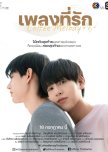
Esta resenha pode conter spoilers
Honestly, I have never been so bored with a show before. I don't know how I managed to finish it.* The storyline was dragging on and on, and I had the feeling that nothing much happened at all. I even drifted off during later episodes. The thing is, I do not mind slower paced series, if -- IF -- it fits the storyline. Also, twelve episodes of basically the same over and over again gets boring whatever the content might be. The plot could have been tightened to maybe four episodes or so.
* The writer seems to have only a passing idea of how the music industry, cafés or workplaces in general work. Examples that annoyed me most: Sentences like "Now that you are debuting, you are a real artist!" (or something like that), an employee mopping the floor during opening hours without reason, taking breaks just ecause you want to, "trainees" that practice unsupervised and are something like eleven years old(?), a freelance composer who then has to got to Shanghai (?). Overall, it feels as if the writer was one of those "trainee" children.
* The camera work was uninspired and kind of static.
* The acting was stiff, which was most apparent in group scenes, where those actors who did not have something to say just stood around like mannequins.
* The sets showed the tight budget, and putting a rainbow flag doesn't improve things. Although I did like the colour scheme they chose.
* Other people have already commented on the band's musical abilities, which I cannot remark upon, since I myself have no abilities in this field whatsoever. I don't think the pink-haired guy's singing was very good though.
* If the story is about tasty coffee, then I want to see tasty coffee! We haven't even seen how Plengrak brews it -- show us how the grounds look like when the water is poured into the filter, at least. The director responsible should maybe look at some Japanese shows who excel in showing food and drinks and make the audience crave them.
All in all, I'd say to give this series a miss.
Esta resenha foi útil para você?

If you don't have the budget, you should you use it to your advantage
Overall, I liked the idea -- people coming into a café where its barista can make a coffee flavored drink based on the cup you choose and then, when you drink it, it will help with the problem you currently have.It's an interesting twist on shows with similar ideas like the Japanese "Three Star Bar" or the S-Korean "Would you like a cup of coffee".
I also don't mind that it is basically just a long commercial for the Vibie platform.
What I do mind is that the production is lacking.
In episode one, there are serious sound problems, which do get better in the following episodes.
The acting is bad to mediocre -- considering that most of the people are just internet personalities, not actors, it is probably to be expected.
The set is ... obviously a set that is trying very hard to be a real café. I can only guess why they couldn't rent an actual café for their filming or why the set looks so cheap (what café has only one table and a sofa and is an office space converted to a café?) -- probably they did not have the budget.
In my view, if you don't have enough money to make things look good, you should either choose a story to something you can afford (the new "Fake Buddies" did this very well) or you "own" it. Why not go all the way and make it obvious that this is a set? Let it take place on a theatre stage, make the props look like props -- except maybe for the magical coffee -- theatre is magic, and the way the drinks help people is too -- and with this, you'd have made a mediocre story with a small budget into something special.
As it is, I can only say: Nice try, do better next time.
Esta resenha foi útil para você?
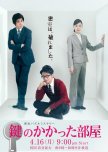
If you miss all of the old detective classics then give this one a try!
This is a classic Whodunnit crime drama, only that the Who is not the question, only the How.It has all the tropes:
* There is the eccentric genius (Enomoto), who is set apart from the world by mannerisms and interests. His personal life and background is mostly of no importance (and in this case, even a mystery),
* He has sidekicks who are mostly there to give a bit of comedy and occasionally provide some important clue
* It's case driven, not character-driven -- There's little to no character development. In fact, apart from some broad strokes, we don't know much ablout the three main characters.
* The cases are presented in episodic format, one case per episode, and in each episode there's the same clear structure.
* The way each scene is set up -- from the way Enomoto inspects the crime scenes to the spatial arrangement of the characters in key moments -- it all feels very old-school.
* And, last but not least, the background music. These new and fresh melodies are used in a classic way -- we hear the "he's thinking hard", the "the important clue is coming", the "this is the introductory scene", the "here comes the comedy part" in the respective scenes.
I am not able to explain this in detail, but it feels as if the writer and the director used these tropes very deliberately to create something new from the old. I welcomed these tropes as old friends in new clothes, rather than roll my eyes at them.
Seems boring? For case aficionados, it isn't.
The cases are, as usual sometimes a bit far-fetched, but always solidly built. If the viewer is paying attention, they can even spot the main clue or at least guess the outline of the solution. During the introductory scene, Enomoto usually gives a hint what to look out for (I only noticed that after eight episodes or so, which is a shame). Only in a few episodes there's a clue we only get told during the relevation scene.
The fresh air mostly comes from the main premise -- even though everything else is a classic "Whodunnit", it's about the "How" not the "Who". All of the cases are locked-room murders; Enomoto is a lock-smith, who is only interested in how the room can be "unlocked". As a consequence, we usually know who the culprit was very early.
Even though the characters are only painted in broad strokes, they don't come across as one-dimensional -- I felt that I knew them like new-ish colleagues, I know how they are at the work place and what to expect from them, and I know a few titbits about their private life. The script and the actors were very good at hinting at a backstory for the characters, implying that there has gone more than a few thoughts into the world-building here. This is enhanced by the excellent acting -- especially the minuscule shifts in Enomoto's face combined with his almost robotic bady language give him more depth than being just a puzzle-solver.
Overall, this is worth a watch, maybe even a second one after a few months to see if I can catch more hints and clues. I like the way the creators took the classic tropes of the detective genre and used them to their advantage to make something fresh.
Esta resenha foi útil para você?

You need courage to take the next step
This movie with its simple love story has fast become one of my favourites -- a story about two very ordinary men who fall in love with each other and take the first steps into a relationship.I love how the film shows us the insecurities that come with having a crush on a man as a man, the questions that come with getting to know another person -- will you like me, too? Do we have a chance to come together? Will I take the step into the unknown?
And at the same time, both men as well as us get to experience the giddiness when we feel that our feelings might be reciprocated.
We get to see how these two men, who seem to be very different in their hobbies and lives, try to find the courage to open up to each other -- only then the relationship may move forward.
The film makers obviously had to make do with a low budget, there are some sound issues in outdoor scenes. But they did not need much more -- as I said before, this is a simple love story of two ordinary men, who could be our neighbours, our colleagues, ourselves. Accordingly, the use of places, of light that is already there makes the film feel very real.
I also love the sets, which are lovingly filled with small details: There's the changing date on the white board behind Koiwai's desk. There's the small detritus of the life of a working person in Yamashita's room. There are the messy bed sheets near the end of the film.
I'm looking forward to rewatching the story of these sweet and gentle people.
Esta resenha foi útil para você?

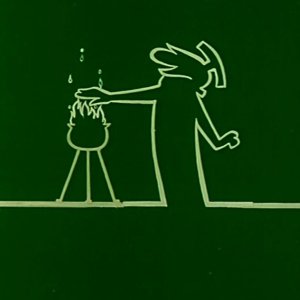
 4
4













